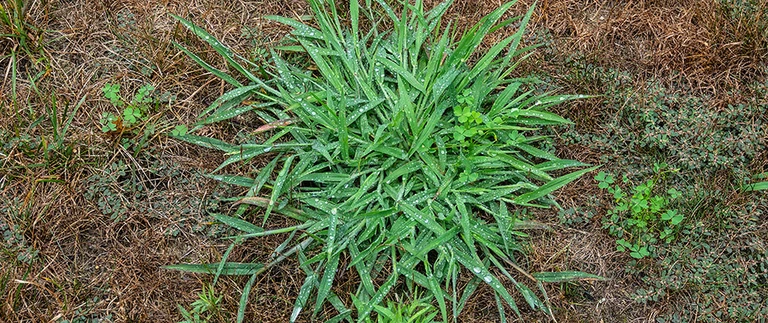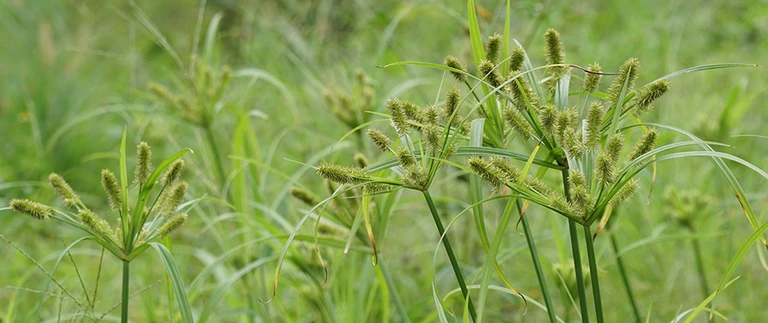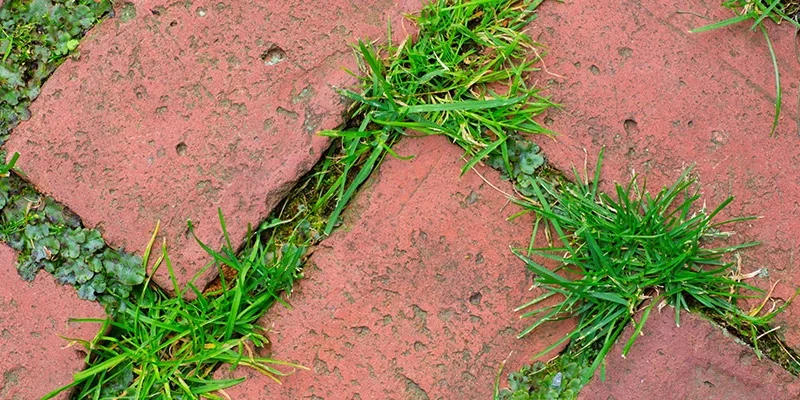Perennial weeds like crabgrass, yellow nutsedge, quackgrass, and dandelion can be a real pain in the neck. Due to their root systems, they will keep on regenerating unless dealt with properly. Simply pulling them will not do the trick. These weeds can produce thousands of seeds which will spread far and wide, hence their unwanted presence in many lawns and landscapes around Noblesville.
Fortunately, our company has extensive training and experience in eradicating these pesky weeds. If they are found in your own yard, it's important to take action and prevent them from stealing essential nutrients from your grass and plants. Below, we have outlined 4 invasive weeds and how to control them.
Crabgrass can produce up to 150,000 seeds per plant.

Crabgrass is no stranger to many lawns in Indiana. Once it makes its way onto your property, it can become an evil foe. These invasive weeds are very resilient. They can withstand hot summers - even drought-like conditions - and can also thrive when the quality of the soil is low. While some types of grass need to grow tall in order to produce seeds, crabgrass can do so even when it has been mowed down to a length of 1/2 inch. These weeds can produce as many as 150,000 seeds that start germinating in early spring.
Crabgrass is found everywhere. You'll see it not just in lawns, but even in your garden beds and bare patches of soil. According to Purdue University, having a healthy and dense turf is the best way to control the growth of crabgrass.
Using pre-emergent and post-emergent herbicides can help to control the growth of crabgrass.
Yellow Nutsedge reproduces quickly and grows even with poor soil conditions.

It's easy to spot yellow nutsedge in a lawn with their bright golden flowers and grass-like leaves that can grow up to three feet. They reproduce through tubers and rhizomes with one tuber able to reproduce 1,000 new ones. This capacity to reproduce at a great rate has made it one of the trickiest weeds in the world. An interesting fact about the yellow nutsedge is that it was once cultivated and eaten as a food source in the olden days.
This invasive weed disperses quickly and at great distances. It can be quite difficult to manage them because yellow nutsedge is able to tolerate environmental stresses and, on top of that, it has a layered root system. However, this weed does thrive in soil that has poor drainage, so watering them deeply may help to control them.
Quackgrass is a perennial weed with an intricate root system.

Quackgrass is a creeping perennial with an ashy blue-green color and broader leaves that will feel rougher to the touch. This weed is another tough foe, with each plant able to produce 25 seeds. These seeds are able to germinate in the soil for many years. Clearing them manually may not be very effective because of its intricate root system.
If you do find them while they are still starting to grow, it is best to act quickly and pull them up, making sure the roots are included. If it is too late for manual removal, non-selective herbicide should do the trick.
Dandelion is an edible weed that can travel long distances.

The dandelion is probably the most recognizable weed on this list. Both the yellow flowers and whispy seeds are common in many lawns, especially from late April until the middle of May when they flower. Each plant produces around 15,000 seeds and it can travel long distances - that's why it so widespread.
Dandelions also have a strong taproot which allows them to survive even with just some segments. That is why even just taking them out with a hoe may not be effective at all. To fully eradicate them, use herbicides.
Despite being classified as a weed, dandelions are actually edible. In fact, they contain lots of nutrients such as vitamins A, C, iron, and calcium.
Start your journey to a healthy and weed-free lawn with our weed control and fertilization program. Call (317) 316-8272 today!
At Sprout Lawn & Landscape, we offer weed control and fertilization services to help homeowners keep their lawns green and flourishing throughout the whole year. If you are a resident in the Noblesville, Carmel, Westfield, IN area, give us a call at (317) 316-8272 to get a quote for our services or have a consultation with a team member.
Our fertilization and weed control program runs from spring to fall. Some of the treatments we offer include pre-emergent weed control and post-emergent weed control, both of which will work efficiently against the "criminally" invasive weeds we have listed above. Don't hesitate to contact us so we can help you get rid of those weeds today.




